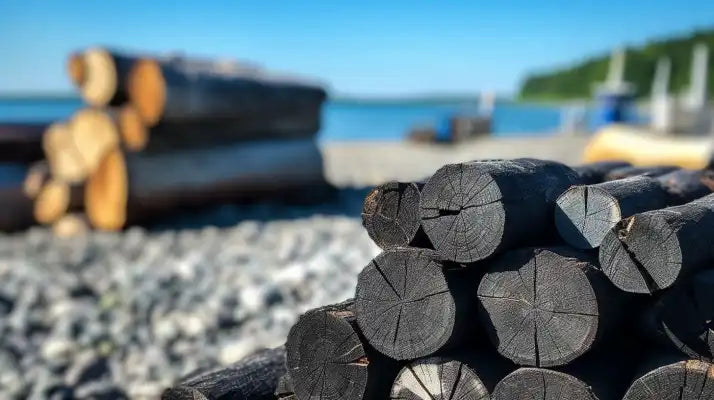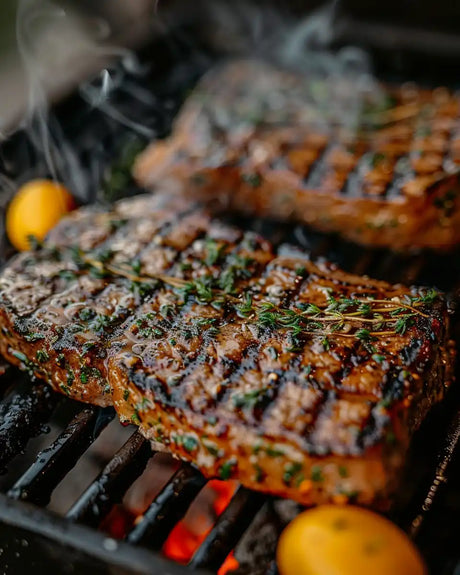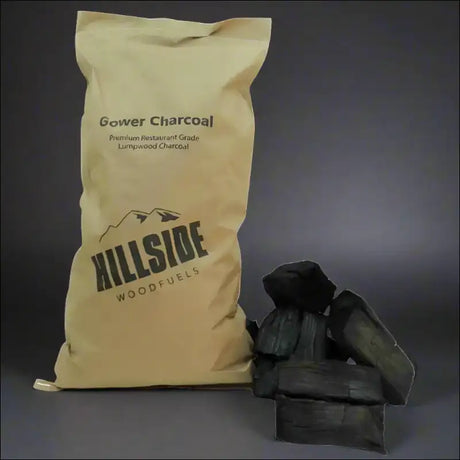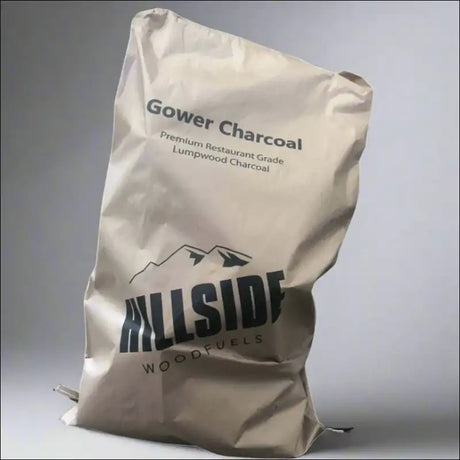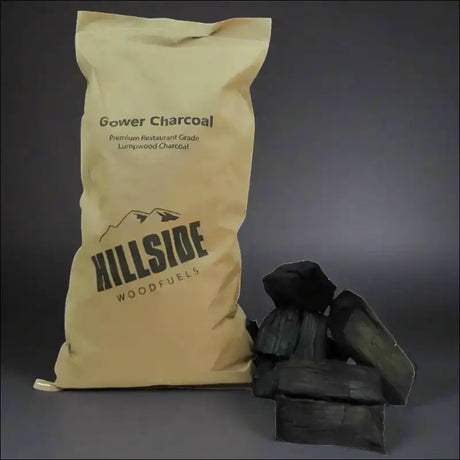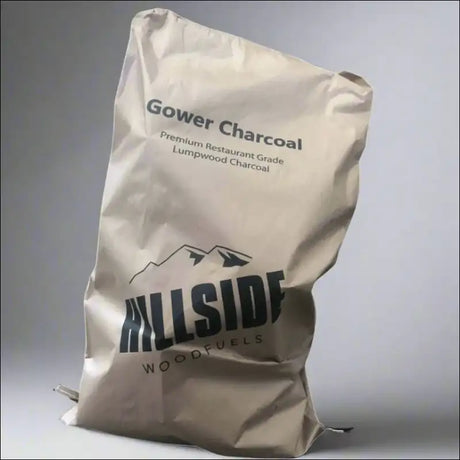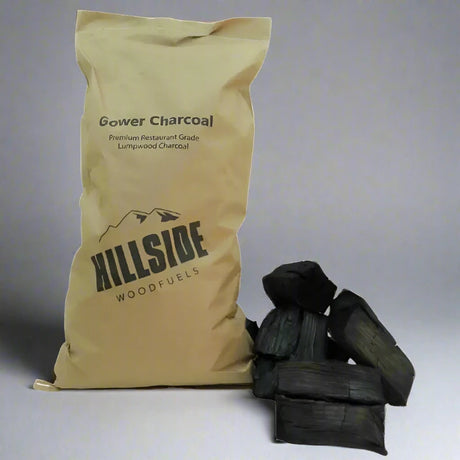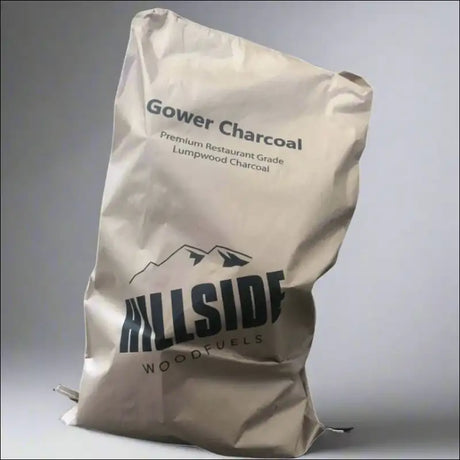Introduction
There's little as delightful as gathering around a sizzling grill, be it for a laid-back garden barbecue or a sophisticated al fresco dining experience. But the magic of these memorable gatherings often hinges on a crucial detail - the selection of fuel for your grill.
Many assume that charcoal is merely charcoal. However, you've actually got a choice between two main variants: lumpwood and briquettes. Each has its unique perks and drawbacks, and the choice you make can drastically influence the success and flavour of your grilling adventure.
The Importance of Picking the Right Fuel for Grilling
Selecting the right fuel for your barbecue isn't just a trivial matter. It's of immense importance, influencing both the taste and cooking duration of your meal. Differing fuels burn at varying temperatures and produce dissimilar levels of smoke, all of which impacts your cooking time and the level of flavour seeping into your food. Moreover, certain fuels might be more suited for specific meats or particular cooking techniques.
But the implications go beyond mere taste and cooking speed. The fuel you choose has a direct impact on the environment too. The manufacturing and distribution of charcoal can contribute to substantial carbon emissions. Hence, choosing a greener alternative can help to lower your carbon footprint while still letting you relish a mouth-watering grilled feast.
Getting to Know Lumpwood and Briquettes
Lumpwood charcoal is the product of burning natural wood until all moisture is eradicated, leaving only pure carbon in the form of irregular chunks. It is often thought of as more natural than briquettes as it lacks any additional substances or chemicals - it's simply wood in its most primal state. Briquettes, however, are made from compacted sawdust mixed with an array of chemicals that help retain their shape (and occasionally boost their burning properties).
The consistency in their shape and size makes them particularly user-friendly every time you fire up the grill. Both lumpwood and briquettes come with their individual set of strengths and weaknesses. Thus, it's crucial to comprehend each type before making your final decision on which to choose for your upcoming barbecue.
The Merits of Lumpwood Charcoal
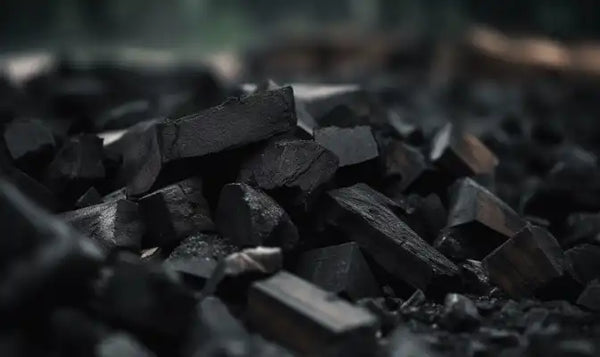
If you're a fan of grilling, you'll agree that choosing the right fuel is key to mastering the art. Amidst a sea of options, lumpwood charcoal stands out due to its distinctive properties and advantages.
How is Lumpwood Charcoal Produced?
Lumpwood charcoal comes into being by burning wood in an environment with restricted oxygen, resulting in char. These chunks are then categorised based on size and packaged ready for your barbecuing pleasure.
The wood of choice for creating lumpwood charcoal is usually hardwood like oak, hickory, or maple. Unlike briquettes, which often contain binders and fillers to maintain their shape, lumpwood charcoal is entirely natural, free from any additives or chemicals.
Chemical-Free, Natural Burning
A key benefit of using lumpwood charcoal is its clean burn, void of any harmful chemicals or additives. As a result, there's no risk of your food being tainted with chemical residues or undesirable tastes.
Lumpwood charcoal also produces less ash compared to briquettes, thanks to the absence of fillers or binders. This makes the post-grilling clean-up a far more straightforward task.
Rapid Heating
Lumpwood charcoal boasts a swift heating time, a considerable advantage. Thanks to its lower density and absence of binders, it ignites faster than briquettes. Depending on the size of the chunks, your grill can be ready for cooking in a mere 15 minutes post lighting up your lumpwood charcoal.
High-Heat Output
One standout advantage of choosing lumpwood over briquettes is the high heat it generates due to its high carbon content. This allows you to sear meat rapidly while preserving its moisture and flavour.
Being a product of hardwood, lumpwood charcoal also burns for longer than other charcoal types, making it a cost-effective choice over time. Any leftover chunks can be reused for your subsequent barbecues, as they lack any fillers or chemicals that could potentially affect their performance.
Distinct Smoky Flavour
Lumpwood charcoal lends a unique smoky taste to the food, a feature much-loved by barbecue enthusiasts. This unique taste comes from the natural aroma and flavour of the wood being infused into your meat as it cooks over the hot coals. The specific type of wood used has a direct impact on your food's flavour profile.
For instance, hickory imparts a robust smoky taste, while oak delivers a subtler, more balanced flavour. If you're on the hunt for a natural fuel that offers quick heating, high heat output, low ash production, chemical-free burning, and bestows a unique smoky flavour to your grilled foods – then lumpwood charcoal should definitely be on your list.
The Intricacies of Briquettes
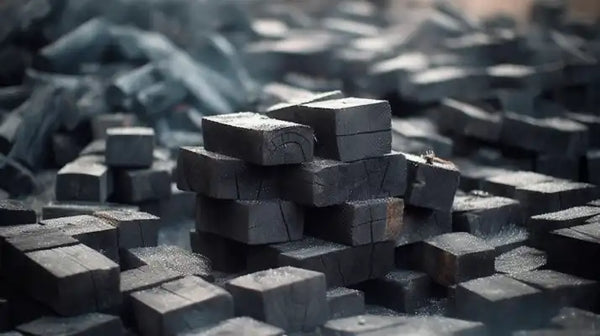
Briquettes, a popular fuel choice for grilling, are created by combining charcoal fines, sawdust, and various binders such as starch or molasses. This mixture is then mechanically pressed into uniform shapes, making briquettes easier to handle and store compared to lumpwood charcoal.
The materials used to produce briquettes often come from waste products and leftover wood, lending to their eco-friendly reputation. However, bear in mind that some manufacturers may introduce chemicals to the mix for enhanced combustion or colouring purposes.
The Perks of Opting for Briquettes
One notable advantage of using briquettes is their consistent burning time. Due to their uniform size and density, briquettes burn at a steady rate, sans sudden flare-ups. Moreover, they are easy to ignite and provide easy temperature control.
Many briquette brands offer "instant light" options that do away with the need for lighter fluid or other ignition sources. Additionally, briquettes generate a lesser quantity of ash compared to lumpwood charcoal, translating to less post-cooking clean-up.
Consistent Burning Time
Briquette manufacturers strive for uniformity in each piece's size and density, resulting in a consistent burning time. This allows you to control your grill's temperature more conveniently, without fretting over sudden heat surges that could scorch your food. Plus, for long cooking sessions, such as smoking ribs over several hours with low heat on gas grills or Kamado-style cookers like the Big Green Egg, you can strategically position your briquettes to ensure even heat distribution across the grill surface.
Ease of Ignition and Temperature Control
Most brands of briquettes offer "instant light" options that negate the need for lighter fluid or other ignition aids. These briquettes are pretreated with a chemical that ignites quickly upon exposure to heat or a match. This makes starting your fire an effortless task, sans any additional tools.
Furthermore, as briquettes burn at a steady rate, it's simpler to maintain your grill's temperature. With lumpwood charcoal, minor alterations in airflow can lead to significant temperature changes. However, with briquettes, you can maintain a steady cooking temperature throughout your grilling session.
Lower Ash Production
A notable disadvantage of lumpwood charcoal is the significant amount of ash it produces. In contrast, briquettes generate far less ash and leave fewer particles that could form hot spots on your grill surface. This translates to less time spent cleaning up post grilling, and fewer worries about ash obstructing vents or dampers on Kamado-style cookers like the Big Green Egg or Weber Smokey Mountain Cooker.
Contrasting Lumpwood Charcoal and Briquettes
Comparing Costs
The price disparity between lumpwood charcoal and briquettes is a key difference. Generally, lumpwood charcoal comes with a steeper price tag than briquettes, primarily due to the production process. The creation of lumpwood charcoal involves the use of natural hardwood - a more costly raw material compared to those used in making briquettes.
Briquettes are produced from compressed sawdust and other wood waste mixed with additives to bind them together. The process for making briquettes is simpler and less energy-intensive, leading to a lower price point than lumpwood charcoal.
The availability of both fuels can also affect their prices. In certain regions, one fuel type may be more easily accessible than the other, which can influence the cost.
Taste: A Matter of Personal Preference
When it comes to taste, many prefer the flavour imparted by lumpwood charcoal. As it burns hotter and faster than briquettes, lumpwood charcoal sears meats more effectively. Moreover, it doesn't contain additives or chemicals, unlike some briquette brands, leading to a purer taste with less smoke flavour.
However, some appreciate the flavour profile delivered by certain types of briquettes. A few companies infuse flavours such as hickory or mesquite into their briquettes, offering food a unique smoky taste. When it comes to taste, the choice between lumpwood charcoal and briquettes essentially boils down to personal preference.
Environmental Impact: Pros and Cons
Both types of fuel present advantages and disadvantages in terms of environmental impact. Lumpwood charcoal is perceived as more eco-friendly since it's crafted from natural hardwoods sans additional chemicals or additives. As it's made by carbonising wood in an oxygen-free environment, it's considered a renewable resource.
Conversely, briquettes utilise sawdust and other wood waste that might otherwise end up in landfills. However, some briquette brands incorporate additives like coal dust and borax that could increase pollution when burned.
Another consideration is the transportation required to bring these fuels to consumers. Briquettes are often produced locally, whereas lumpwood charcoal may be imported from abroad, thereby increasing its carbon footprint.
Ultimately, both fuels come with environmental pros and cons. Consumers should choose the fuel that best aligns with their values and priorities concerning sustainability.
Wrapping Up
Choosing between Lumpwood Charcoal and Briquettes
When selecting between lumpwood charcoal and briquettes, personal preference and factors such as taste and cost come into play. While lumpwood charcoal, with its cleaner and hotter burn, may seem an attractive choice, it also carries a higher price tag.
Conversely, briquettes, while offering varied flavours and affordability, might not burn as hotly or cleanly as lumpwood charcoal. Environmental impact is a consideration for both, with varying pros and cons hinging on their production and transportation processes.
In the end, the choice depends on your individual sustainability values and environmental consciousness. Regardless of your fuel choice for grilling or smoking meats, safety should be paramount—practise proper grilling techniques and maintain a safe distance from open flames.
Summary and Recommendations
Deciding between lumpwood charcoal and briquettes can be a challenging decision for many barbecue enthusiasts. Lumpwood charcoal, made from natural wood, offers a unique smoky flavour, quick heating time, and high heat output. Briquettes, however, are made from compressed sawdust and deliver consistent burning time with low ash production. When it comes to cost, briquettes are typically more affordable but might not deliver the same natural taste as lumpwood charcoal.
Both fuel types present their pros and cons regarding environmental impact. Ultimately, it's your preference. If you prize the unique smoky flavour derived from natural wood, quick heating time, and high heat output, lumpwood charcoal is the choice for you. If, however, you value consistent burning time and low ash production, briquettes may be the better option. If environmental impact concerns you, alternative fuels such as propane or electric grills might be a consideration.
Simply put, both lumpwood charcoal and briquettes offer their own advantages and drawbacks depending on your needs. It's crucial to weigh these factors before deciding on the ideal fuel for your next barbecue adventure.
An Encouraging Note
Whether you prefer lumpwood charcoal or briquettes, or perhaps alternative fuels such as propane or electric grills, all options are valid. The most crucial aspect is that you wholly enjoy your grilling experience. Feel free to experiment with different fuels and wood chips to discover what suits you best.
Grilling offers a splendid opportunity to gather people around a shared love of food and the great outdoors. So, whether you're preparing a round of burgers or a basket of veggies, embrace the process and savour every mouthful!
Frequently Asked Questions
-
Q: What is the primary difference between charcoal lumpwood and charcoal briquettes?
A: Lumpwood is the raw form of charcoal, made directly from hardwood material. On the other hand, briquettes are manufactured from wood by-products and compressed with a binding agent to form their distinctive shape.
-
Q: Which type of charcoal provides a longer burn time?
A: Briquettes, due to their compact and uniform shape, tend to have a longer burn time than lumpwood.
-
Q: Which charcoal is easier to light?
A: Lumpwood charcoal typically lights faster than briquettes due to its porous nature.
-
Q: How does the heat production differ between lumpwood and briquettes?
A: Lumpwood can reach higher temperatures more rapidly, while briquettes produce a more consistent, albeit lower, heat over a longer period.
-
Q: Do lumpwood and briquettes impart different flavours to food?
A: Lumpwood charcoal, being a natural product, might impart a more 'woodsy' flavour, while briquettes burn cleaner with less of a smoky taste.
-
Q: Which type of charcoal is more environmentally friendly?
A: Lumpwood charcoal is typically more environmentally friendly as it is made from sustainable sources and does not contain additives that briquettes may have.
-
Q: What are the price differences between lumpwood and briquettes?
A: Generally, lumpwood is more expensive than briquettes due to the pure, high-quality wood used in its production.
-
Q: Which type of charcoal is better for beginners?
A: Briquettes are often recommended for beginners as they provide more consistent heat and are easier to manage.
-
Q: Does one type of charcoal produce more ash than the other?
A: Briquettes tend to produce more ash than lumpwood due to the binders and fillers used in their creation.
-
Q: Can both lumpwood and briquettes be used in all types of grills?
A: Yes, both can be used in any grill, but the choice will depend on the specific requirements of the grilling process.
-
Q: Are there specific dishes that work better with either lumpwood or briquettes?
A: Quick-cooking dishes may benefit from the intense heat of lumpwood, while slow-cooking dishes might prefer the sustained heat of briquettes.
-
Q: Which charcoal is easier to store and why?
A: Briquettes, due to their consistent shape and size, are generally easier to store than lumpwood.
-
Q: How does the smoke production vary between lumpwood and briquettes?
A: Lumpwood tends to produce more smoke than briquettes, which may influence the smoky flavour in your cooking.
-
Q: Which type of charcoal is quicker to set up for cooking?
A: Lumpwood is quicker to light and reach cooking temperature, making it faster to set up than briquettes.
-
Q: Can you mix lumpwood and briquettes when grilling?
A: Yes, many grill masters mix the two for optimal heat control, the briquettes for sustained heat and the lumpwood for higher temperatures.

